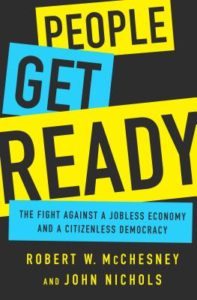 Has your inbox been full of messages related to new privacy policies? Have you read them? Why is this happening now? On May 25, a new law goes into effect across the European Union. The General Data Protection Regulation strengthens individual privacy rights and has teeth for enforcement. Each notice is a result of legislation to protect citizens in other countries. This is not a result of U.S. legislation and it shows you how digital connections span the globe.
Has your inbox been full of messages related to new privacy policies? Have you read them? Why is this happening now? On May 25, a new law goes into effect across the European Union. The General Data Protection Regulation strengthens individual privacy rights and has teeth for enforcement. Each notice is a result of legislation to protect citizens in other countries. This is not a result of U.S. legislation and it shows you how digital connections span the globe.
 Media critic Bob McChesney wrote a book with John Nichols titled People Get Ready: The Fight Against a Jobless Economy and a Citizenless Democracy (2016). We are on the verge of our nation’s darkest hour or its greatest moment. As writers and citizens, the issues of a free press, copyright, and privacy strike close to home.
Media critic Bob McChesney wrote a book with John Nichols titled People Get Ready: The Fight Against a Jobless Economy and a Citizenless Democracy (2016). We are on the verge of our nation’s darkest hour or its greatest moment. As writers and citizens, the issues of a free press, copyright, and privacy strike close to home.
We can’t ignore what we know now about Russian propaganda and disinformation campaigns in which Facebook, Google, Twitter, Microsoft, YouTube, and Amazon were complicit. And the enormous profits. But it’s more than the money. It’s about meaning.
In an environment based on ratings and rankings, the truth is determined by what is popular not on facts, evidence, and reason. And if the measure of what is popular can be rigged, whether for profit or political gain, we all lose.
 We now live in a world in which Google determines what we see and read. Google controls 89% of all internet searches. If you are trying to get found online as an author, then Google is the only game in town.
We now live in a world in which Google determines what we see and read. Google controls 89% of all internet searches. If you are trying to get found online as an author, then Google is the only game in town.
Who or what determines the meaning of who you are online? Algorithms and artificial intelligence owned by corporate technology giants bigger than any single government. Can you control your identity, your privacy, your personal security as an author? Not entirely. To publish is to go public. And to get published, authors must be transparent and accountable to the public.
You can’t entirely escape social media, so it is important to develop a more savvy strategy.
 Using social media on your phone puts you at increased risk for hacking, identity theft, stalking, doxing, gaslighters, trolls, bots, and other cybercrimes.
Using social media on your phone puts you at increased risk for hacking, identity theft, stalking, doxing, gaslighters, trolls, bots, and other cybercrimes.
There are several new books coming out this fall from ex-tech gurus who recognize the genie has been unleashed and recommend unplugging and tuning out social media, especially on your phone. Your Happiness Has Been Hacked is one of them (forthcoming from Berrett Koehler Publishing). Intermittent rewards for behaviors online in the form of likes or notifications with the pings to your phone work much like Pavlov and his dog who he trained to ring a bell for a food reward.
The conditioning and programming of our brains as writers by social media conflicts with our brains functioning as creative writers.
When you use social media, don’t think of it as marketing. It’s not a good place to try sell your own book. But do use is as a search tool. You can find a lot of leads to track down for marketing purposes. Organizations, associations, book clubs, conferences, workshops, calls for submissions, book awards. Use social media to do research, not marketing.
 Growing your platform does not necessarily mean increase the number of followers or friends online. Being online, however, means your platform should begin to grow organically if your writing draws people into conversations with you. But the numbers game is deceptive. Don’t get caught up into trying to game algorithms. You will extend your reach if you reach up, not out. Who do you look up to in your field of writing or expertise? Who are those whose professional careers you admire? Who are your real life heroes? Social media strategy is to consider contacts the equivalent of sales leads. The leads aren’t always the buyers, but they lead you to a buyer. Who is leading you in your social media stream of feeds? Reach up instead of reaching out. Pull your readers instead of pushing your book.
Growing your platform does not necessarily mean increase the number of followers or friends online. Being online, however, means your platform should begin to grow organically if your writing draws people into conversations with you. But the numbers game is deceptive. Don’t get caught up into trying to game algorithms. You will extend your reach if you reach up, not out. Who do you look up to in your field of writing or expertise? Who are those whose professional careers you admire? Who are your real life heroes? Social media strategy is to consider contacts the equivalent of sales leads. The leads aren’t always the buyers, but they lead you to a buyer. Who is leading you in your social media stream of feeds? Reach up instead of reaching out. Pull your readers instead of pushing your book.
 When it comes to marketing your book, focus on I.R.L. In. Real. Life. This is the essence of good marketing. You sell more books through real people-to-people word-of-mouth connections than any other way. In short, make social media merely a line item in your marketing budget with no more than 10% of your resources instead of a non-stop suck on your time. Using social media for publicity and promotions works and can be beneficial but the rate of return doesn’t warrant the expenditure. In your marketing budget, the other 90% is focused on real people.
When it comes to marketing your book, focus on I.R.L. In. Real. Life. This is the essence of good marketing. You sell more books through real people-to-people word-of-mouth connections than any other way. In short, make social media merely a line item in your marketing budget with no more than 10% of your resources instead of a non-stop suck on your time. Using social media for publicity and promotions works and can be beneficial but the rate of return doesn’t warrant the expenditure. In your marketing budget, the other 90% is focused on real people.
Unplug sometimes. Spend more time offline and in real life. Plan writing sabbaticals away from social media.
 Limit your social media time. And one of the limits is that you consider it social time, not time spent on your writing projects. A young successful short story writer and recent MFA graduate adopted a new strategy that may help other writers find the middle ground. Casey Martinson checks into Facebook once a week for two hours. On Saturdays. This is a cut-back from intermittent non-stop interactions for several years. Once a week of reading updates from friends and family is a big giant bulletin board full of news from cyberspace. Then he writes one longish post. Like a letter to friends. Limiting your time when you are on social media may be a good start to your new strategy.
Limit your social media time. And one of the limits is that you consider it social time, not time spent on your writing projects. A young successful short story writer and recent MFA graduate adopted a new strategy that may help other writers find the middle ground. Casey Martinson checks into Facebook once a week for two hours. On Saturdays. This is a cut-back from intermittent non-stop interactions for several years. Once a week of reading updates from friends and family is a big giant bulletin board full of news from cyberspace. Then he writes one longish post. Like a letter to friends. Limiting your time when you are on social media may be a good start to your new strategy.
Spend less time on social media. Read more. Respond less. Write rarely.

Invest more time in face-to-face relationships. IN. REAL. LIFE. You can extend new relationships into social media connections, but you can’t replace the rewards of interpersonal interactions between real human beings. Cultivate your literary community and build connections with booksellers, librarians, writers. Attend workshops and literary festivals. Take classes and attend conferences. Meet people and make real connections.
Stop blogging so frequently. Longer pieces—higher quality and less frequent. Once a month or once a season. If you haven’t started a blog, now is not the time. Spend your time In Real Life.
It’s about relationships, the social, not the media. People. And quality not quantity. Knowing the right people. Good people. People with integrity.

Good advice! When I rejoined the social media several years ago, I set several rules for myself. No politics. No religion. Only post stuff my readers would be interested in. Nothing too personal. That has changed my social media experience for the better.
I’m happy to know it’s okay to only blog once a month! And your advice to make connections with Real People is good. Selling my book through personal connections is working well for me.